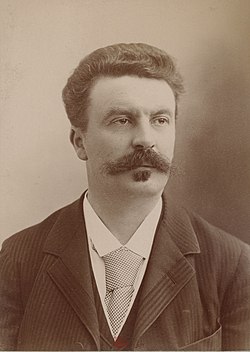Guy de Maupassant Quote
The human mind is a lucky little local, passing accident which was totally unforeseen, and condemned to disappear with this earth and to recommence perhaps here or elsewhere the same or different with fresh combinations of eternally new beginnings. We owe it to this little lapse of intelligence on His part that we are very uncomfortable in this world which was not made for us, which had not been prepared to receive us, to lodge and feed us or to satisfy reflecting beings, and we owe it to Him also that we have to struggle without ceasing against what are still called the designs of Providence, when we are really refined and civilized beings.
The human mind is a lucky little local, passing accident which was totally unforeseen, and condemned to disappear with this earth and to recommence perhaps here or elsewhere the same or different with fresh combinations of eternally new beginnings. We owe it to this little lapse of intelligence on His part that we are very uncomfortable in this world which was not made for us, which had not been prepared to receive us, to lodge and feed us or to satisfy reflecting beings, and we owe it to Him also that we have to struggle without ceasing against what are still called the designs of Providence, when we are really refined and civilized beings.
Related Quotes
Accident - A statistical inevitability. Some nuclear power plants are built on fault lines, but ever mine, dam, oil rig, and waste dump is founded upon a tacit acceptance of the worst-case scenario. O...
About Guy de Maupassant
Maupassant was a protégé of Gustave Flaubert and his stories are characterized by economy of style and efficient, seemingly effortless dénouements. Many are set during the Franco-Prussian War of the 1870s, describing the futility of war and the innocent civilians who, caught up in events beyond their control, are permanently changed by their experiences. He wrote 300 short stories, six novels, three travel books, and one volume of verse. His first published story, "Boule de Suif" ("The Dumpling", 1880), is often considered his most famous work.
